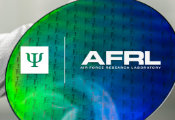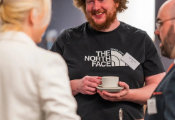Nuclear Spins Tamed for Quantum Applications
Nuclear Spins Tamed for Quantum Applications
Nuclear spins in a crystal can be detected and manipulated through their interactions with the more accessible electron spin of a neighboring crystal defect. This strategy has enabled nanoscale magnetic resonance imaging and other quantum applications. But a long-standing challenge has been to target a specific nuclear spin, while protecting the delicate quantum nature of the electron spin. Important progress on this challenge has now been achieved by two teams at the Delft University of Technology in the Netherlands.
TU Delft Appoints TNO’s Richard Versluis as Quantum and Computer Engineering Fellow
TU Delft Appoints TNO’s Richard Versluis as Quantum and Computer Engineering Fellow
Richard Versluis will become a Quantum and Computer Engineering (QCE) fellow at the Faculty of Electrical Engineering, Mathematics, and Computer Science at Delft University of Technology. He will continue his work as Principal Systems Engineer at TNO.
Quantum Computing Inc. Secures Quantum Photonic Vibrometer Order With Delft University of Technology
Quantum Computing Inc. Secures Quantum Photonic Vibrometer Order With Delft University of Technology
Quantum Computing Inc. (“QCi” or the “Company”), an innovative, integrated photonics and quantum optics technology company, today announced it has received its second purchase order in the Company’s LiDAR-based R&D offering. This latest order comes from the Department of Aerospace Structures and Materials at Delft University of Technology in the Netherlands. TU Delft is a world renowned public technical university, consistently ranking in the top 20 of technical universities globally. TU Delft specializes in engineering, technology, computing, design, and the natural sciences, winning multiple awards such as JEC Composites Innovation Award 2025 and Airbus-BMW Quantum Computing Challenge.
Fujitsu Announces Winners of Quantum Simulator Challenge
Fujitsu Announces Winners of Quantum Simulator Challenge
Fujitsu today announced the winners of its Quantum Simulator Challenge 2024, a competition to foster open innovation and identify practicial use cases for quantum computing. The awards ceremony will take place at Fujitsu Quantum Day 2025 Japan, an event for the quantum community, to be held on Friday, March 28, 2025, at Fujitsu Uvance Kawasaki Tower.
Fujitsu and QuTech Realize High-Precision Quantum Gates
Fujitsu and QuTech Realize High-Precision Quantum Gates
Fujitsu Limited today announced the world’s first demonstration of a complete universal quantum gate set for diamond spin qubits with an error probability below 0.1%, achieving a fidelity among the highest reported over all quantum hardware technologies. This collaboration with QuTech, a leading quantum technology research institute of Delft University of Technology (TU Delft), marks an important step for the diamond spin method towards carrying out quantum error correction and realizing practical quantum computing. The findings were published in Physical Review Applied on March 21, 2025.
Alice & Bob and the CEA to Host Exclusive Fault-Tolerant Quantum Computing Workshop at Les Houches
Alice & Bob and the CEA to Host Exclusive Fault-Tolerant Quantum Computing Workshop at Les Houches
Alice & Bob, a leader in fault-tolerant quantum computing, in partnership with the CEA, is set to host an invite-only workshop on Fault-Tolerant Quantum Computing (FTQC) at Les Houches School of Physics from April 20 to 25, 2025. This exclusive gathering will feature speakers from some of the most prestigious universities and leading quantum computing companies in the world. Hosting 70 top researchers in quantum computing, condensed matter and theoretical physics, the workshop will provide an immersive overview of current developments and the next frontier of scalable quantum technologies.
New Quantum Sensing Technology Reveals Sub-Atomic Signals
New Quantum Sensing Technology Reveals Sub-Atomic Signals
Now, engineers at the University of Pennsylvania School of Engineering and Applied Science (Penn Engineering) have utilized quantum sensors to realize a groundbreaking variation of nuclear quadrupolar resonance (NQR) spectroscopy, a technique traditionally used to detect drugs and explosives or analyze pharmaceuticals.
€10M Project Eyes 100 Qubit Diamond Quantum Computer
€10M Project Eyes 100 Qubit Diamond Quantum Computer
A €10m consortium funded by the European Commission and supported by the Quantum Flagship is using diamond and silicon carbide to build quantum computers and quantum simulators that can run at room temperature. The SPINUS project is developing quantum simulators with more than 50 qubits and quantum computers with over ten qubits, the team expects that their research will provide a strategy to scale up to over 1000 and 100 qubits, respectively, within five years post-project.
Fujitsu and QuTech Collaborate to Build Scalable Quantum Computing Blueprint for the Future
Fujitsu and QuTech Collaborate to Build Scalable Quantum Computing Blueprint for the Future
QuTech and Fujitsu have recently announced a partnership to develop a blueprint for a scalable quantum computer. This collaboration is centered around delivering a comprehensive framework for building quantum computers that addresses all major components required for scalability and reliability. According to the announcement, the partnership takes a “full-stack approach,” which encompasses everything from physical qubit modules to high-level error-correction algorithms designed to stabilize quantum computations.
Quantum Researchers Cause Controlled ‘Wobble’ in the Nucleus of a Single Atom
Quantum Researchers Cause Controlled ‘Wobble’ in the Nucleus of a Single Atom
Researchers from Delft University of Technology in The Netherlands have been able to initiate a controlled movement in the very heart of an atom. They caused the atomic nucleus to interact with one of the electrons in the outermost shells of the atom. This electron could be manipulated and read out through the needle of a scanning tunneling microscope.


























